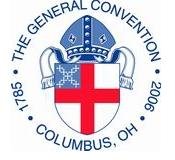Happy Easter! As I used to tell the children when I was a day school chaplain, "Chaplain Susan didn't do 40 days of Lent to do just ONE day of Easter ... so we're going to celebrate all FIFTY days of Easter!" So let's start with some Good News to celebrate this Easter Monday: the platform just released by "The Consultation" offering not just a legislative agenda for General Convention but a vision for the Episcopal Church -- grounded in the one Lord, one Faith and one Baptism that bind us together as the Body of Christ called to do justice, love mercy and walk humbly with our God.
It strikes me as an extremely hopeful sign that as we move closer to Columbus and General Convention 2006 there are faithful folks at work creating a proactive platform for a vision calling us to look beyond fighting over the unity of the institutional church to proclaiming the mission of the prophetic church: Alleuluia, Alleluia!
The Consultation Platform: The Consultation is a coalition of eleven independent organizations* in the Episcopal Church committed to peace with justice. We come to the 2006 General Convention in Columbus understanding clearly that the Episcopal Church is once again at a watershed moment in history. Now more than ever, it is critical to articulate what we believe and what we are called to do.
We affirm the goodness of all creation.
• We join our voices with God, who, after completing all of Creation said, “It is very good.”
• We see the image of God in one another and in all of Creation.
• We are inextricably linked in an interdependent web of Creation.
We have sinned and fallen short of the mark.
• We fail to recognize the image of God and the Christ in others and ourselves.
• We have by our action and inaction perpetuated a culture of greed, domination, and violence.
• We in the Episcopal Church have been complicit in this sin.
We have allowed our governance to be distorted.
• We believe that all the baptized are called to share in the governance and mission of the Church at all levels.
• We see the increase of power claimed by the episcopate as an imbalance in the Body.
• We compromise the church as sign and witness by not sharing our resources.
We reaffirm the promises of our Baptismal Covenant
• to continue in the apostles’ teaching and fellowship, in the breaking of bread and in the prayers.
• to persevere in resisting evil and, whenever we fall into sin, to repent and return to the Lord.
• to proclaim by word and example the Good News of God in Christ.
• to seek and serve Christ in all persons, loving our neighbor as ourselves.
• to strive for justice and peace among all people and to respect the dignity of every human being.
Therefore, we call the Church, gathered at this 2006 General Convention, to:
1. Continue the radical reformation of the Church.
• remove all canonical obstacles to exercising the full baptismal ministry in the whole life of the Church.
• conform the canons to the baptismal theology of The Book of Common Prayer.
2. Invest in economic justice and eliminate poverty.
• support the U.N. Millennium Development Goals fully, including the 0.7%
allocation of funds.
• affirm worker justice, including the right to unionize.
• advocate for a living wage and health care for all.
• invest in economic justice to eliminate poverty.
• ask the Church Pension Group to provide equitable retirement policies for women.
3. Make reparation for slavery.
• commission a report to describe the Church’s culpability, preserve this chapter of our history, and make recommendations for compensation.
• support public legislation and compensation.
• apologize publicly for the Church’s role in this violation of basic human rights.
4. Dismantle racism.
• call upon every diocese to mandate anti-racism training.
• deepen our commitment to inclusive representation on slates for leadership at all levels of the Church.
5. End the culture of violence
• work for the end of violence against women and children throughout the global
village.
• work to change federal budget priorities that fuel the culture of violence at the
expense health and welfare at home and peace abroad.
• include in Safe Church training orientation to issues of domestic violence and
appropriate responses.
• confess the violence inherent in using language for worship that is not inclusive,
expansive, and hospitable.
6. Build a culture of peace.
• call for an end to the war in Iraq.
• offer training in creative peacemaking in every diocese.
• inform our young people of the conscientious objector registry at the Episcopal
Church Center.
• add peace, justice, and nonviolence studies to the curricula of all Episcopal schools, colleges, and seminaries.
• encourage investment in enterprises that bring peace and prosperity to areas of
conflict.
7. Clarify our theology of marriage, family, and human sexuality
• oppose the limitation of adoption and other civil contracts on the basis of sexual
orientation or marital status.
• relieve the clergy from their responsibility as civil magistrates in marriage.
• reaffirm that all orders of ministry are open to all the Baptized who are otherwise qualified.
8. Promote environmental justice
• mandate detailed energy audits and conservation measures, including recycling, in all Episcopal Church facilities and programs.
• commit the Episcopal Church to purchasing electric power from renewable sources.
• call for the federal government to fund fully its Environmental Protection Agency
Superfund.
• call upon our government to recommit to the Kyoto Protocols.
9. Reflect our mission priorities in Program, Budget, and Finance
• Urge Program, Budget, and Finance to restore the original askings for mission and economic justice programs.
============
*
Integrity is one of the eleven member organizations of The Consultation.
Other member organizations are:
Episcopal Urban CaucusEpiscopal Peace Fellowship Episcopal Women's Caucus Union of Black Episcopalians
Episcopal Ecological Network
Episcopal Church Publishing Company Episcopal Network for Economic Justice
Episcopal Asiamerica Ministry Advocates
Associated Parishes for Liturgy and Mission Province 8 Native American Ministries Network
 by Mary Frances Schjonberg
by Mary Frances Schjonberg











